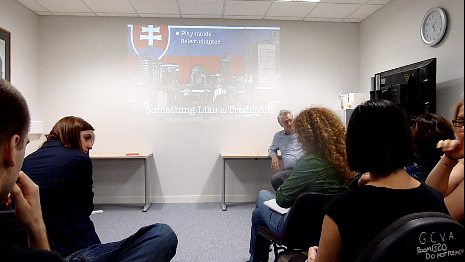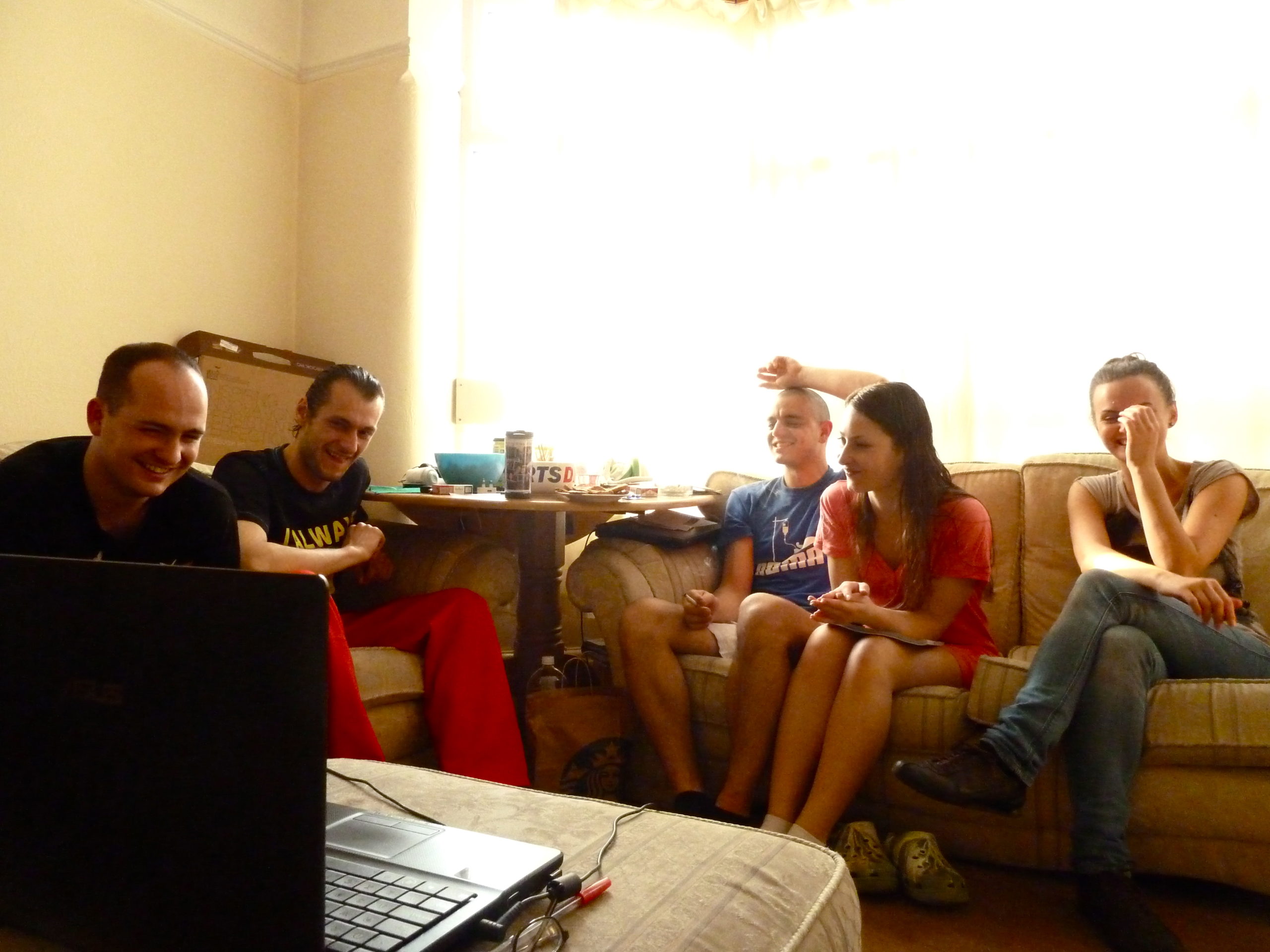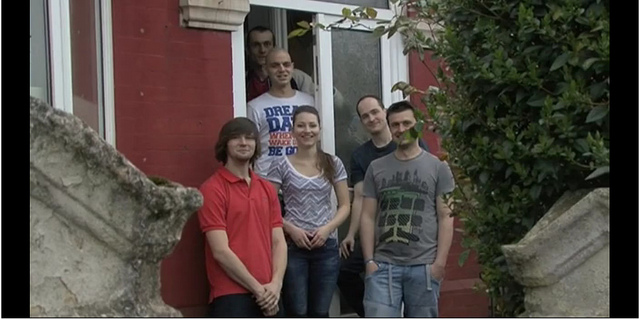“Something Like a Tradition”
June 8, 2012
Finally, it’s here!
Feedback from our class
Our film was screened for our class and supervisors on May 23rd in the Granada Centre.

The feedback was generally all positive, and a discussion ensued related to choices in subtitling, the equal inclusion of our two stories (Easter and their immigrant lives), the introductions of our characters, and even the title of our film (one of our supervisors suggested Just For Now as a possible title, I like it, but changing the title would have to be a discussion with Rae).
To my great surprise, not a word was mentioned concerning the macho tradition or sexism, about which I was very nervous. This may be because all of our coursemates had already been primed and prepared about what they were about to see. I suppose the real criticism may be yet to come, as the film is now on the web.
Feedback from them
The following day, we screened the film to the house and our amazing translator, Zuzu.

From left to right: Allex, Jozef D., Jozef S. (Woodee), Patricia, and Zuzu
They met the film with positive feedback, too. I specifically asked them if they felt we represented them in a nice, truthful, and/or respectful manner. They all felt we had. Jozef S. (Woodee) commented, “I was wondering how the film would look, because when I remembered you filming us, I was thinking how boring we all were and how boring of a movie it would be, but in the end, it’s really, really funny.”
If the timing had worked out better, I definitely would have arranged for the household to see the film before our class. I feel that the single largest responsibility and loyalty you have as an anthropologist while making your film is to your subjects, and showing others your film before you show your participants feels like a betrayal.
Why did they do it?
We know that this tradition is about health, cleanliness (as stated directly at times in the film), family, and friends, but the remaining question is: Why did they do it?
The simple answer? For us. Allex, at one point, while he is preparing the eggs for painting by blowing the yolks out, mentions that they are celebrating for us. He also alludes to this in the hallway, when trying to coax Patricia out of the bathroom (“They want to film you, so you must come out…”)
Josef D. also mentioned this before we began filming, saying that they would be “re-enacting” the tradition for us on camera, since they don’t normally celebrate Easter. Patricia, too, told me off-camera that this was the first time they celebrated Easter in England, even though Jozef S. and Allex had been there for two years, and Jozef D, for eight.
But the most noticeable thing is…why doesn’t it look like they’re “re-enacting” it? Why doesn’t it look fake? Because surely, Patricia’s younger sister, Nina, would be celebrating Easter back home in Slovakia. That was not an act. And surely, at some point in their lives, all of the housemates had celebrated Easter separately with their families. I think that this is at the heart of what beyond observational cinema is getting at. This style of film cannot be labeled as observational, because, while there are scenes shot in an observational style, much of the film was collaborative and its plot conceived by me and Rae.
Time, Time, Time
I think the most frustrating thing about editing this film was working within the given timeframe. 25 minutes was our limit, but our final time was almost 27 minutes. I attribute at least 30 seconds of this time to our credits. Our summer projects will be capped at 30 minutes, a restriction that my mind hasn’t processed with ease. To be fair, 30 minutes is long. But so is 30 hours, which is the amount of footage we’re expected to capture this summer.
I need this limitation, though, as a sort of lesson in self-discipline because most of my work in the future will likely be 30 minutes or less. In the general entertainment industry, viewers judge within five seconds of watching a video if it’s going to be worth their time to continue, and, if they do decide to stay, won’t be staying longer than three minutes, on average. Of course I recognize that full-length ethnographic films (anywhere from 30-60 minutes) are a completely different category than general entertainment videos, the same principles of entertainment and maintain audience retention apply.
A Disclaimer
It is well-known that there are many differences between American and British spellings and slang.
There’s a line that Patricia says when she’s visiting the warehouse that she’ll begin work for soon: “The black-boarded one in the middle of the pavement?” Where “pavement” originally read “sidewalk.” In the tuition session before our class screening, my supervisor burst out laughing at the “sidewalk” subtitle, as, unbeknownst to me, that word does not even exist in British English, and is classically American. Grudgingly, I changed it.
To be “pissed” in British English is to be very drunk. This word originally appeared in the subtitles a few times as a translation from the Slovakian, however, I fought to have this changed to “drunk,” as the word is suitable for both American and British audiences.
There is another, difference, however, that I was only made aware of in the subtitling process, which is grammar. My disclaimer is this: The grammar may seem wrong. The subtitles underwent a final edit by my supervisor, who “corrected” much of my grammar, such as by putting punctuation outside of quotes, eliminating commas in lists, or leaving out punctuation entirely. I’ve been reluctantly convinced by him and others that this is truly correct British grammar. So for any American viewers, please keep in mind the differences, and know that I really did pass all my grammar classes in grade school.
The Film
After a bit of a mess with trying to get the quality a bit better for web, I finally present to you Something Like a Tradition. Click the video thumbnail to watch.
Until next time, tarah!
Leave a Reply Cancel reply
Grab Your Free Copy or Sign Up For The Newsletter
This is the blog post content. It's here to help show what a big block of text will look like. This text will all get replaced by actual blog content. It will be awesome. Vivamus suscipit tortor eget felis porttitor volutpat.
first name
email address
send me the goodies
On your wedding day all you have to do is focus on the love of your life. We're just there to document them. Bear claw marzipan cheesecake candy gingerbread cake.
Our Signature Services
Yay you're engaged! Looking to create save the dates, a wedding website or just show off your new bling?! Well it all starts with engagement pictures.
Are you a wedding photographer looking for dreamy presets? Well look no further you're in the right place!
wedding photography
engagement shoots
photography presets
view services
© 2024 Lara Rose | terms & conditions | Designed by Erika Maram | Photography by Lara rose
Follow along for editorial & documentary weddings


Fascinating look at life in England from the immigrant viewpoint. Found the film very illuminating.